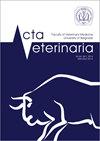呼吸道合胞病毒感染诱导诱导性一氧化氮合酶、CD3和CD8在羔羊自然肺炎中的表达
IF 0.8
4区 农林科学
Q3 VETERINARY SCIENCES
引用次数: 2
摘要
呼吸道合胞病毒(RSV)是一种RNA病毒,属于副粘病毒科肺炎病毒属。本研究的目的是利用免疫组化(IHC)技术评价诱导型一氧化氮合成酶(iNOS)、CD3 (pan T细胞)和CD8(细胞毒性T细胞)在自然感染RSV的羔羊肺中的表达。为此,从屠宰场屠宰的羔羊经宏观检查后,取肺组织样本100份,对照组肺组织样本10份。采用链亲和素-过氧化物酶法(ABC)进行免疫组化染色,100例肺炎患者肺中有18例(18%)RSV阳性。然后对这些阳性病例进行iNOS、CD3和CD8免疫染色,并与对照组进行比较。所有病例中iNOS表达均升高(100%),CD3+ T淋巴细胞升高14例(78%),CD8+ T淋巴细胞升高5例(28%)。在所有RSV阳性病例中iNOS免疫表达均升高,且大多数病例中CD3+ T淋巴细胞数量增加,可见iNOS和CD3+ T淋巴细胞在自然发生的RSV感染的羔羊肺炎的免疫应答中起重要作用。通过这项研究,首次在自然感染RSV的羔羊中评估了上述标记物的作用。本文章由计算机程序翻译,如有差异,请以英文原文为准。
Respiratory Syncytial Virus Infection Induces Expression of Inducible Nitric Oxide Synthase, CD3, and CD8 in Naturally Occurring Pneumonia in Lambs
Abstract Respiratory syncytial virus (RSV) is an RNA virus that belongs to the Pneumovirus genus of the Paramyxoviridae family. The aim of this study was to evaluate the expressions of inducible nitric oxide synthetase (iNOS), CD3 (pan T cells), and CD8 (cytotoxic T cells) in lamb lungs naturally infected with RSV using immunohistochemistry (IHC). For this purpose, 100 pneumonic and 10 control lung tissue samples were taken from lambs slaughtered in the slaughterhouse after macroscopic examination. The streptavidin– peroxidase method (ABC) was used for IHC staining, and it revealed RSV positivity in 18 of 100 examined lungs with pneumonia (18%). These positive cases were then immunostained for iNOS, CD3, and CD8, and compared to controls. In all these cases, an increase in iNOS expression (100%) was detected, the higher number of CD3+ T lymphocytes was detected in 14 (78%) cases while CD8+ T lymphocytes were detected in five (28%) cases, only. Given the increase of iNOS immunoexpression in all RSV-positive cases and increase in the number of CD3+ T lymphocytes in most cases, it was concluded that iNOS and CD3+ T lymphocytes play an important role in the immune response in lamb pneumonia with naturally occurring RSV infection. With this study, the role of the mentioned markers was evaluated for the first time in lambs naturally infected with RSV.
求助全文
通过发布文献求助,成功后即可免费获取论文全文。
去求助
来源期刊

Acta Veterinaria-Beograd
农林科学-兽医学
CiteScore
1.30
自引率
16.70%
发文量
33
审稿时长
18-36 weeks
期刊介绍:
The Acta Veterinaria is an open access, peer-reviewed scientific journal of the Faculty of Veterinary Medicine, University of Belgrade, Serbia, dedicated to the publication of original research articles, invited review articles, and to limited extent methodology articles and case reports. The journal considers articles on all aspects of veterinary science and medicine, including the diagnosis, prevention and treatment of medical conditions of domestic, companion, farm and wild animals, as well as the biomedical processes that underlie their health.
 求助内容:
求助内容: 应助结果提醒方式:
应助结果提醒方式:


